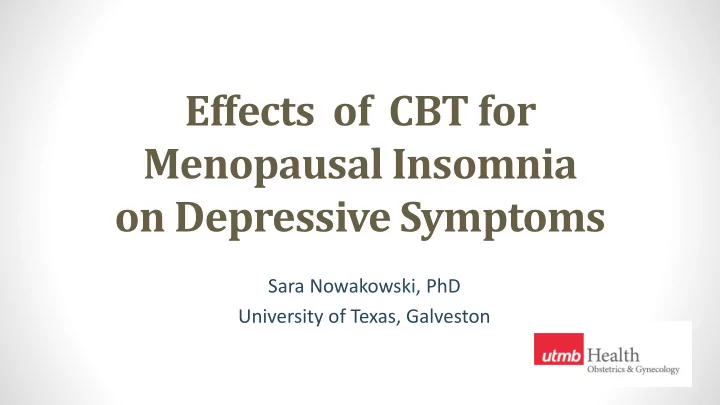

Effects of CBT for Menopausal Insomnia on Depressive Symptoms Sara Nowakowski, PhD University of Texas, Galveston
Insomnia and Depression in Menopause • 39-60% midlife women suffer from elevated insomnia sx 1,2 • 8-40% midlife women suffer from elevated depression sx 1,3 • 12% of the general population has comorbid insomnia and depression 4 • 44% of patients with comorbid insomnia & depression have residual sleep issues after mood symptoms resolve & increased risk of relapse 5 • Comprehensive interventions that simultaneously improve sleep and mood in midlife women are greatly needed 1 NIH, 2005. State-of-the-Science Conference statement: Management of menopause-related symptoms. Ann Intern Med, 142(12), 1003-13. 2 Kravitz et al., 2008. Sleep, 31(7 ), 979-90. 3 Timur and Sahin, 2010. Menopause, 17(3), 545-51. 4 Staner L. 2010. Comorbidity of insomnia and depression. Sleep Med Rev.,14 . 35 – 46. 5 Nierenberg et al., 1999. J Clin Psych, 60(4 ), 221-5.
Objective To preliminarily examine the effects of cognitive behavioral therapy (CBT) for menopausal insomnia on depressive symptoms compared to menopause education control in midlife women CBT Control vs
What is Cognitive Behavioral Therapy (CBT) for Menopausal Insomnia? Combine CBT for Insomnia & CBT for Hot Flashes Behaviors: A set of instructions for changing behaviors that are incongruent with good sleep or ability to cope with hot flashes Cognitions: Address thoughts related to sleep and hot flashes that interfere with good sleep increase hot flash bother Reduce suffering (hope, realistic expectation, acceptance)
CBTMI Components Technique Aim Sleep restriction Restrict time in bed to improve sleep depth & consolidation Stimulus control In bed only when asleep to strengthen bed/bedroom as sleep stimulus Cognitive therapy Address maladaptive beliefs about sleep & hot flashes Sleep hygiene & Promote habits that help sleep & hot flashes eliminate bad habits & hot flash triggers Hot flash coping Relaxation training Reduce physical/psychological arousal
Menopause Education Control (MEC) • A single 50-minute session • Introduced as self-help intervention • Educational handouts • Discuss menopausal symptoms & sleep hygiene
Procedures Study duration = 20 weeks • Screen Week • S1 • Survey 1-2 • S2 Week • PSG* 3-10 • S3 • Survey Week • S4 Follow- 11-12 • PSG Online Up Month Survey 1 Online Follow- Up Survey Month 3 *PSG = polysomnography S = session
Measures Center for Epidemiologic Studies Depression Scale (CES-D) 20-item self-report measure of depressive symptoms 16 = used as cut-off for high vs low depression Hamilton Depression Rating Scale (HDRS) 24-item objective clinical rating of depressive symptoms 8 = used as cut-off for high vs low depression Insomnia Severity Index (ISI) 7 item validated self-report scale to assess insomnia ≥ 10 = detect insomnia -8.4 point change score = moderate improvement
Inclusion-Exclusion Criteria Inclusion criteria • peri/post women; (STRAW +10 criteria) • Insomnia Disorder (DSM-IV ) • ISI>10 or PSQI>8 • ≥ 1 nocturnal hot flash/night Exclusion criteria • Surgical or chemotherapy/radiation-induced menopause • Cognitive impairment • Psychotic disorder, substance use disorder, bipolar disorder • Recent initiation/change in treatments that may impact sleep or HF • As needed use of medications or herbs that may affect sleep or HF • Comorbid sleep disorders [PLMI > 15; OSA (AHI > 15)] NOT excluded if comorbid diagnosis of major depression
Baseline Characteristics (N=40) Measure CBTMI MEC p Age, M (SD) 53 (5.2) 56 (7.1) .10 Race/ethnicity, N (%) nonwhite 12 (63) 5 (25) .04 Menopause stage, N (%) peri 6 (30) 8 (40) .68 Sleep hot flashes/night (self-report), M (SD) 1.7 (1.2) 1.4 (.4) .52 Insomnia Severity Index, M (SD) 15 (3.4) 16 (4.3) .59 Center for Epi Studies Depression Scale, M (SD) 16 (9.0) 15 (11.1) .61 Hamilton Depression Rating Scale, M (SD) 11 (7.1) 9 (6.0) .61 Current Major Depressive Episode, N (%) 3 (15) 1 (5) .64
Self-Reported Depression (CES-D) Effect P-value Time 0.001 Treatment 0.009 Arm Interaction 0.019
Clinician-Assessed Depression (HDRS) Effect P-value Time 0.001 Treatment 0.022 Arm Interaction 0.01
Impact of Baseline Depression on Insomnia Outcome (ISI) Self-Reported Depression Clinician-Assessed Depression Effect P-value Effect P-value Time 0.001 Time 0.001 Condition 0.014 Condition 0.072 Interaction 0.951 Interaction 0.534
Summary Treatment Effects on Depressive Outcomes: For midlife women experiencing insomnia and hot flashes, CBTMI led to clinically meaningful improvements in self reported & clinician assessed depression (CES-D, HDRS) Impact of Baseline Depression on Treatment Response: Treatment response for insomnia severity (ISI) did not differ based on baseline depression severity (high vs low)
Clinical Implications Cognitive Behavioral Therapy for Menopausal Insomnia has added benefits of improving mood in midlife women CBTMI is equally beneficial to midlife women experiencing more severe depressive symptoms Future research is needed to test the efficacy of CBTMI on midlife women with comorbid diagnoses of depression and insomnia
Acknowledgements Co-Investigators : Rachel Manber (K23 primary mentor) Rebecca Thurston (K23 co-mentor and NAMS mentor) NIH Grants : K23NR0140089 Nowakowski UL1TR001439 UTMB Institute of Translational Science K24HL123565 Thurston Hogg Foundation Grant: JRG-265 Nowakowski
CBT-I Resources
Recommend
More recommend